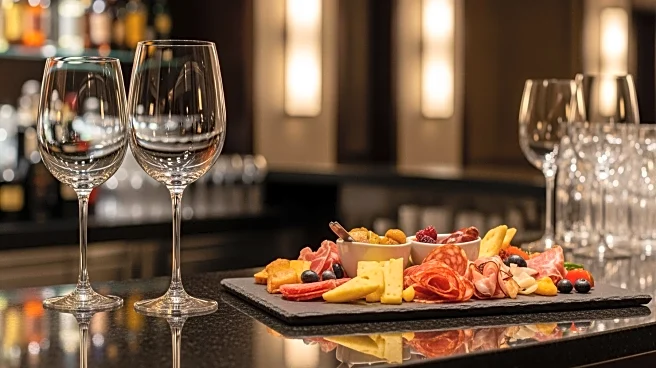What's Happening?
In 2025, U.S. hotels are experiencing a challenging revenue environment, with room revenues increasing by only 0.8% in the first half of the year, according to CBRE's Hotel Horizons report. As a result,
hoteliers are turning to food and beverage (F&B) departments to bolster income. F&B revenue per occupied room (POR) has risen by 3.8%, surpassing the overall hotel revenue increase of 3.0%. This growth is particularly notable in luxury and resort hotels, which have benefited from strong leisure and 'bleisure' demand. The trend reflects a shift in consumer preferences post-pandemic, with hotel restaurants being perceived as safer spaces. Investments in creative F&B offerings and revitalized venues have been well-received, contributing to increased patronage from both in-house guests and external visitors.
Why It's Important?
The focus on F&B as a revenue driver highlights a strategic pivot for the hotel industry amid stagnant room revenue growth. This shift is significant as it underscores the need for hotels to diversify income streams and adapt to changing consumer behaviors. The success of F&B operations can enhance overall profitability, as evidenced by the increase in F&B department profit margins from 28.7% to 29.1%. This trend also indicates a broader industry movement towards enhancing guest experiences through culinary innovation and personalized service. The ability of hotels to compete with standalone restaurants by offering unique dining experiences could redefine the hospitality landscape, potentially leading to long-term shifts in how hotels operate and market themselves.
What's Next?
As hotels continue to navigate revenue challenges, the emphasis on F&B is likely to persist. Hoteliers may further invest in culinary programs and venue renovations to attract more patrons. The industry could see an increase in the creation of dedicated F&B marketing and sales roles to drive growth. Additionally, the trend towards mindful drinking and the introduction of low-alcohol and mocktail options may expand, catering to evolving consumer preferences. Hotels will need to balance these innovations with cost management, particularly in labor and goods, to maintain profitability. The ongoing adaptation to these market dynamics will be crucial for sustaining growth in the competitive hospitality sector.
Beyond the Headlines
The shift towards F&B revenue generation also raises questions about the long-term sustainability of this strategy. As hotels invest in F&B, they must consider the potential impact on their core lodging business. The integration of F&B with other hotel services could lead to a more holistic guest experience, but it also requires careful management of resources and costs. Additionally, the focus on high-income leisure segments may widen the gap between luxury and budget accommodations, influencing market dynamics and consumer access. The industry's ability to innovate while maintaining affordability and accessibility will be key to its future success.











